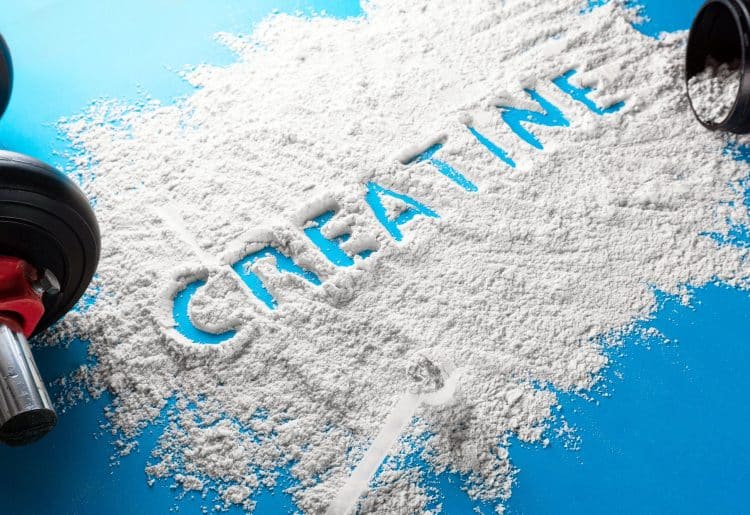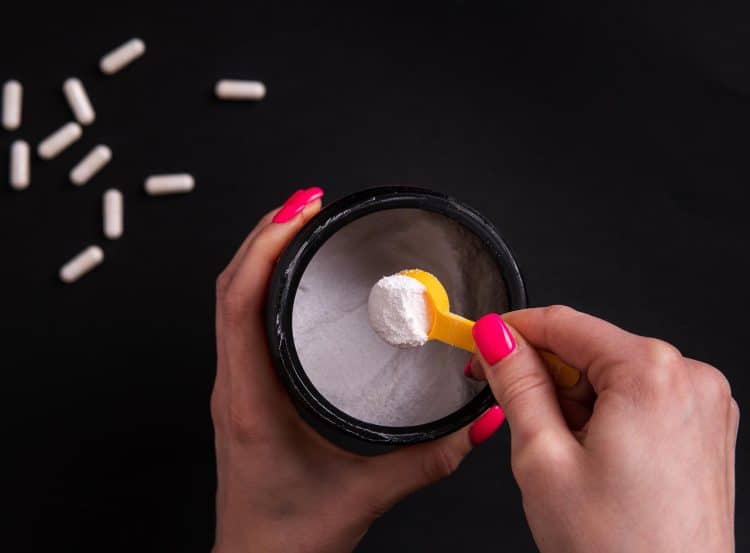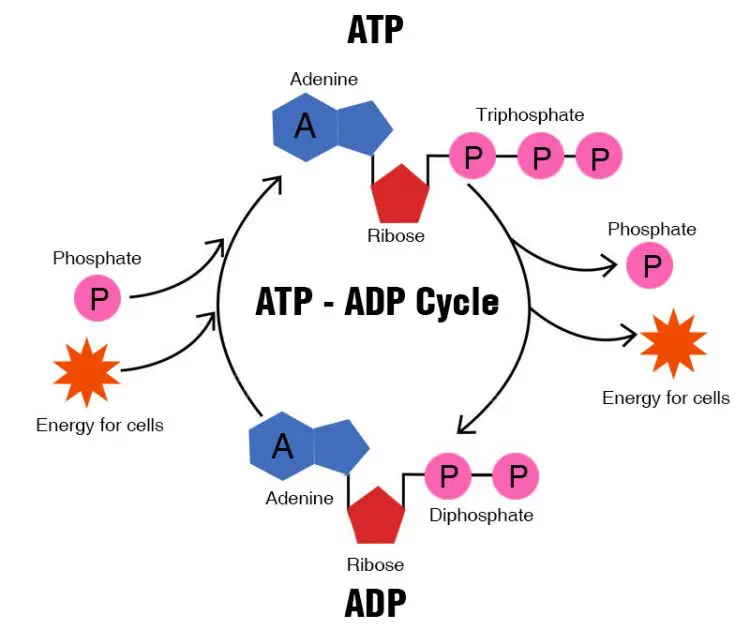Many women question if they should take creatine. You may be wondering about the answers to these common questions. Do the benefits outweigh the risks? Will creatine make me gain weight? As a woman, do I have to take a different amount of creatine than men do? Let’s dive in and research the answer to all of these questions.
What is Creatine?
Creatine is a naturally occurring amino acid derivative that is found in the body [1, 2]. Creatine is primarily consumed in red meat and seafood [1, 2]. It can also be synthesized in the liver and kidneys from amino acids glycine and arginine [1, 2]. Research shows that the body stores approximately 95% of its creatine in skeletal muscle, and the remaining 5% is contained in the liver, kidneys, and brain (and testes in men) [2, 3]. However, those numbers have come from studies that only include men. Other research shows that women store 70–80% less creatine than men do [4].

This may be because the amount of creatine that can be stored in skeletal muscle is based on a person’s body size and muscle mass, and most women naturally have a smaller build than men do. Women also consume less dietary creatine than men do [4].
Research shows that creatine levels may also be influenced by a woman’s menstrual cycle [4]. Serum creatine levels are higher when estrogen is at its peak, specifically in the luteal phase of the menstrual cycle, and then decrease again in the next phase [4]. All of this research indicates that women may benefit from supplementing creatine as a means to increase their creatine stores, especially during their menses, pregnancy, and post-partum [4].
How Does Creatine Effect The Body?
Creatine plays a role in supplying muscles with energy during exercise [1]. ATP (adenosine triphosphate is the energy source that muscles need to contract [4, 5]. When muscles contract, they use an energy phosphate from ATP, then ATP becomes ADP (adenosine diphosphate) [4, 5].
To avoid muscle fatigue, ADP can be resynthesized by the body into ATP again. During this state, the body combines creatine with a phosphoryl group to form an enzymatic reaction called creatine kinase [2, 4, 5].
Creatine kinase is the process that the body relies on to resynthesize ATP [2, 5]. As stored creatine is used during exercise to resynthesize ATP, creatine stores become depleted [5]. As creatine stores are becoming depleted, the body begins to synthesize creatine itself and refill its creatine stores [5].
Creatine supplementation before engaging in physical activity can saturate the muscle and supply them with a longer duration of energy [2].
How Does Creatine Benefit Women?
Athletic Performance
One of the most common reasons people supplement creatine is to improve their athletic performance. Multiple studies have been conducted that show that supplementing creatine increases athletic performance [1, 3, 2, 4, 8].
Creatine supplementation is known to improve high-intensity exercise performance, improve single and repetitive sprint performance, increase work capacity, improve training tolerance, and increase maximum effort [2, 3].
One study found that individuals who supplemented creatine and engaged in resistance training experienced increased performance, endurance, and max repetitions by 8-14% [3]. However, it is important to note that this study only involved male participants [3].
Studies that observe the impact of creatine supplementation on women’s exercise performance are limited, but we can still look at the results of studies that observe men [3, 4]. We know that research has found consistent results in the relation between creatine supplementation and exercise performance in males, so it can be safe to assume that women can experience the same results (at an equal or lesser value). Multiple studies suggest that women may experience improved exercise performance similar to men [4, 8].
Muscle Strength and Muscle Mass
Creatine supplementation has been seen to improve muscle strength and increase muscle mass in females who engage in regular resistance training [1, 2, 4, 6, 7, 8, 11].
While a majority of studies have only had male participants, some studies have studied the effects of creatine on muscle strength and mass in women. However, the studies show that women often do not experience as much of an increase in muscle strength or muscle mass as men do [2, 6].
One study, which observed untrained females, found that ten weeks of creatine supplementation was effective in increasing lower-body strength and maintaining strength for the duration of the workout [6]. However, no change was seen in upper body strength [6].
One study found that creatine supplementation in females significantly increased their muscular power [4]. But another said that they saw no improvement greater than training alone would provide [7].
It is a common misconception that creatine supplementation will cause women to gain bulky muscles. However, based on the research, it is simply not true.
Exercise Recovery and Injury Prevention
Not only does creatine increase exercise performance, muscle strength, and muscle mass, but it also plays a role in exercise recovery and injury prevention.
Evidence from multiple studies suggests that creatine supplementation before exercise can reduce muscle fatigue and muscle damage during exercise, which helps protect from injury when performing exhaustive repetitions [2]. These studies were mostly conducted with male participants, but it can be safe to assume that women would experience the same effect.
Body Composition
Creatine supplementation may also improve female body composition. It is a common misconception that women will gain weight if they supplement creatine. However, research shows that creatine does not influence body weight or lean body mass gain [4, 6, 11, 12].
If you experience any weight gain while supplementing creatine, the weight gain is more likely to be a result of diet or muscle gain as a result of resistance training.
Cognitive Function
There is some evidence that creatine supplementation may improve cognitive function [2, 3, 4].
Approximately 5% of the creatine in the body is stored in the kidneys, liver, and brain. The concentration of creatine in the brain is highly dependent on age, diet, and other lifestyle factors [4]. Creatine supplementation has been seen to increase brain creatine stores by 5-15%, which resulted in improved cognitive function and reduced mental fatigue [2, 3, 4]. Studies have seen this result for both men and women. However, women specifically have been seen to have improvements in mental capacity when they are sleep deprived during pregnancy and postpartum [4].
There is also potential that creatine supplementation could reduce acute and chronic stressors, but more research is needed for this to be conclusive [9].
Improve Health Status
Creatine supplementation may also improve health status and reduce the biomarkers of disease [2, 4].
Evidence is beginning to show that creating can help lower cholesterol, improve glycemic control, minimize bone loss, inhibit inflammation, reduce oxidative stress, improve symptoms of fibromyalgia, and even slow tumor growth of some cancers [2, 4].
Pregnancy
Researchers speculate that creatine supplementation may also be beneficial during pregnancy [4, 10]. Animal studies show that creatine supplementation can improve fetal neuroprotection [4, 10]. However, studies have only been conducted on animals, and no studies have involved humans [4, 10].
How Much Creatine Do Women Need and When?
Based on research, women can take the same dose of creatine as men [2, 4].
When you first start supplementing creatine, you must begin with a loading dose in order to saturate your muscle creatine stores [2, 4]. A loading dose of creatine can be calculated at 0.3 grams of creatine monohydrate per kilograms of body weight, or typically 5 grams [2]. The loading dose is to be taken four times a day for 5-7 days in a row [2, 4]. After the duration of taking a creatine loading dose is complete, you can continue to take a regular dose of 5 grams a day to maintain creatine store saturation [2, 4].

Some evidence suggests that taking a creatine supplement in combination with carbohydrates can increase creatine retention, so taking it during a snack or meal may be beneficial [2].
One study attempted to find out if there was a difference in benefits of creatine supplementation between taking it in the morning, afternoon, or evening [11]. While they found that exercise performance was better in the afternoon, they were unable to determine if it was due to the timing of creatine supplementation or the body’s circadian rhythms [11]. Athletes typically perform the best in the afternoon as the cardiac rhythm influences temperature, blood pressure, energy metabolism, and hormone secretion [11].
While we may not be able to define the exact time that supplementing creatine would be the most beneficial, we do know that creatine levels typically peak 60 minutes after ingestion [2].
What Type of Creatine Should Women Take?
While many manufactured forms of creatine are available as a supplement, creatine monohydrate is the most commonly researched form of creatine [2, 3]. Based on the extensive amount of research completed on the benefits of creatine monohydrate, it remains to be the most beneficial form that you can take as a supplement [2, 3].
Are There Any Risks of Taking Creatine?
Creatine has been observed to be a safe dietary supplement that poses very few risks to most individuals [1, 4, 12].
Research studies have observed creatine supplementation to be safe at a normal dose of 5 grams for up to ten years of use [1]. Studies have not been completed to examine any long-term effects of creatine over ten years, so the safety of lifelong creatine supplementation can not be determined [1, 3].
Even though creatine supplementation is generally safe, certain individuals should take it with caution [1]. Women who are pregnant or breastfeeding should be cautious as there is a lack of research on the risk of creatine supplementation in these situations [1]. Those with bipolar disorder are cautioned to avoid supplementing creatine as creatine may increase manic episodes [1]. Also, those with kidney disease or Parkinson’s disease should take creatine with caution as it could worsen symptoms [1].
Learn more about Creatine:
- The 5 Supplements Worth Taking (And Another Five That Aren't)
- Creatine Before and After: How Creatine Supplement Affects Your Body
- I’m a Supplement Researcher — These 3 Creatine Forms Will Supercharge Your Gains (and One’s a Total Rip-Off)
- Creatine and Acne: Are You Making This Common Mistake?
- STOP Wasting Your Creatine! The Ultimate Guide to Proper Usage
- How Long Does Creatine Stay in Your System? A Doctor Explains
- What Happens To Your Body When You Take Creatine Every Day For Muscle Gain?
- Creatine + Whey Synergy: The Science Behind This Power Duo's Muscle-Building Magic
FAQs
What does creatine do to a woman’s body?
Creatine affects ATP energy maintenance in skeletal muscle, which is needed to have continuous muscle contractions during exercise.
Are creatine supplements safe for women?
Yes! Research shows that creatine supplementation is safe for women. Only those who are pregnant or breastfeeding should supplement creatine with caution.
Does creatine cause women to gain weight?
Creatine itself will not cause weight gain. If weight gain is experienced, it may be due to increased muscle mass from engaging in resistance training or diet.
Wrapping Up
Creatine is considered a safe dietary supplement for women to take. There are little to no adverse effects of creatine supplementation and many benefits. While the research on the benefits of creatine supplementation has mostly been conducted with male participants, based on the few studies that have been conducted on females, it is safe to assume that women experience the same benefits from creatine supplementation as men.
References
Fitness Volt is committed to providing our readers with science-based information. We use only credible and peer-reviewed sources to support the information we share in our articles.
- Medline Plus. (2021, October). Creatine: MedlinePlus Supplements. https://medlineplus.gov/druginfo/natural/873.html
- Kreider, R. B., Kalman, D. S., Antonio, J., Ziegenfuss, T. N., Wildman, R., Collins, R., Candow, D. G., Kleiner, S. M., Almada, A. L., & Lopez, H. L. (2017). International Society of Sports Nutrition position stand: safety and efficacy of creatine supplementation in exercise, sport, and medicine. Journal of the International Society of Sports Nutrition, 14(1). https://doi.org/10.1186/s12970-017-0173-z
- Cooper, R., Naclerio, F., Allgrove, J., & Jimenez, A. (2012). Creatine supplementation with specific view to exercise/sports performance: an update. Journal of the International Society of Sports Nutrition, 9(1). https://doi.org/10.1186/1550-2783-9-33
- Smith-Ryan, A. E., Cabre, H. E., Eckerson, J. M., & Candow, D. G. (2021). Creatine Supplementation in Women’s Health: A Lifespan Perspective. Nutrients, 13(3), 877. https://doi.org/10.3390/nu13030877
- Rasmussen, C. J. (2008). Nutritional Supplements for Endurance Athletes. Nutritional Supplements in Sports and Exercise, 369–407. https://doi.org/10.1007/978-1-59745-231-1_11
- Brenner, M., Rankin, J.W., Sebolt, D. (2000). The Effect of Creatine Supplementation During Resistance Training in Women, Journal of Strength and Conditioning Research: May 2000 – Volume 14 – Issue 2 – p 207-213
- Ferguson, T. B., & Syrotuik, D. G. (2006). Effects of Creatine Monohydrate Supplementation on Body Composition and Strength Indices in Experienced Resistance Trained Women. The Journal of Strength and Conditioning Research, 20(4), 939. https://doi.org/10.1519/r-18485.1
- Kambis, K. W. (2003, March 1). Short-term Creatine Supplementation Improves Maximum Quadriceps Contraction in Women. Human Kinetics. https://journals.humankinetics.com
- Roschel, H., Gualano, B., Ostojic, S. M., & Rawson, E. S. (2021). Creatine Supplementation and Brain Health. Nutrients, 13(2), 586. https://doi.org/10.3390/nu13020586
- Dickinson, H., Bain, E., Wilkinson, D., Middleton, P., Crowther, C. A., & Walker, D. W. (2014). Creatine for women in pregnancy for neuroprotection of the fetus. Cochrane Database of Systematic Reviews. https://doi.org/10.1002/14651858.cd010846.pub2
- Jurado-Castro, J. M., Campos-Pérez, J., Vilches-Redondo, M. N., Mata, F., Navarrete-Pérez, A., & Ranchal-Sanchez, A. (2021). Morning versus Evening Intake of Creatine in Elite Female Handball Players. International Journal of Environmental Research and Public Health, 19(1), 393. https://doi.org/10.3390/ijerph19010393
- de Guingand, D. L., Palmer, K. R., Snow, R. J., Davies-Tuck, M. L., & Ellery, S. J. (2020). Risk of Adverse Outcomes in Females Taking Oral Creatine Monohydrate: A Systematic Review and Meta-Analysis. Nutrients, 12(6), 1780. https://doi.org/10.3390/nu12061780
Tip: If you're signed in to Google, tap Follow.












